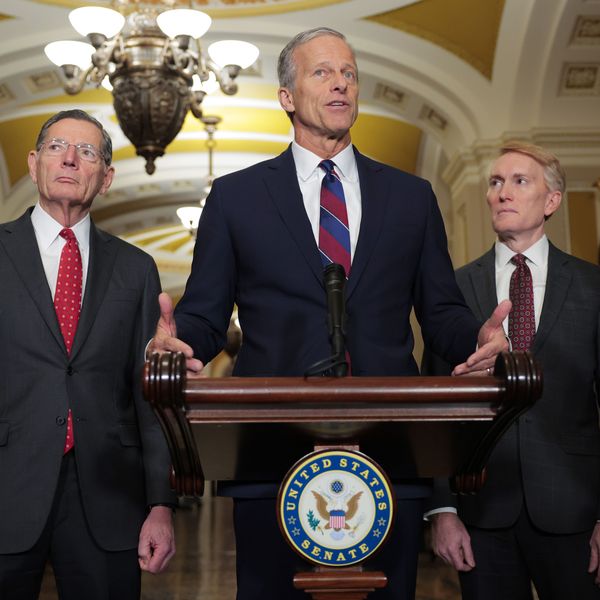Behold: A Republican Health Care Plan
In their quest to repeal Obamacare, Republicans have faced two political problems. First, while the Affordable Care Act isn't a popular law, polls show that the idea of simply going back to the way things were is far less popular.

The second is that for the last three years they've been promising a replacement for the president's signature legislation, and their failure to provide one made them look uninterested in -- or incapable of -- addressing in a serious way a real problem for American families.
But on Monday, Sens. Richard Burr (R-NC), Tom Coburn (R-OK) and Orrin Hatch (R-UT) -- three Republicans who have long worked on health care issues -- tried to address these problems by finally unveiling a comprehensive alternative to Obamacare.
In one sense, it's a sign of progress, an acknowledgement that Obamacare is changing the American health care system in ways that can't easily be undone and a concrete proposal that can serve as a point of serious debate.
The problem is that it's grounded in the same old conservative thinking about what ails our health care system. And, as such, a central piece of the lawmakers' solution is making the vast majority of Americans pay more for their coverage.
As Sam Baker reported for the National Journal, "the plan attempts to lower health care costs by making people shoulder a greater share of those costs--or 'sensitizing' consumers to the actual cost of health care, as Senate aides put it in a meeting with reporters on Monday."
Most people don't recognize how much their employer contributes to their health care plan and don't see the costs the insurance company covers. If people are spending more of their own money, many conservatives argue, they'll be smarter consumers. Overall costs will come down, the argument goes, if consumers have more "skin in the game."
Currently, the employer-based insurance that covers around four out of five Americans isn't taxed. The GOP's plan would limit that exclusion to 65 percent of the cost of an average plan. Those with average plans would pay taxes on 35 percent of their costs, and those with more comprehensive insurance would pay more. As Baker writes, "the idea is to make consumers more aware of how much their health care plan costs (by making them pay part of it), so that employees will go to their bosses and ask for cheaper plans." The Republican version of magical thinking.
As Sarah Kliff notes in the Washington Post, economists tend to favor reducing or eliminating this tax break because it subsidizes health care for high earners with "Cadillac" insurance plans. But the public hates it because it hits them in the pocketbook.
A bigger problem is that we pay sky-high costs for health care goods and services. Everything from surgery to pharmaceuticals to routine tests cost us more than the citizens of other developed countries, and "more skin in the game" just means getting households to shoulder a larger share of those costs.
The lawmakers' proposal also would repeal a number of taxes and fees on health care companies that help pay for Obamacare's subsidies for low- and middle-income workers. It would continue to offer tax credits to help families buy insurance on the individual market, but would reduce the eligibility cutoff for those subsidies from 400 percent of the poverty line under the ACA to 300 percent. The subsidies would also be less generous. And unlike the current law, they would increase with a person's age, rather than according to income.
Both Obamacare and the Republicans' alternative encourage healthy people to carry health insurance. The Affordable Care Act does this with an individual mandate, which polls have found to be the only specific provision of Obamacare that doesn't enjoy majority support. The Republican plan would achieve this through fear. Their alternative would only guarantee coverage for people with pre-existing conditions if they remain continuously insured. Those who lose coverage could face serious costs under this plan - or not be able to buy insurance at all - when they return to the insurance market.
Obamacare expands eligibility for Medicaid (in states that opt in) to everyone making up to 133 percent of the poverty line. The GOP replacement would limit that to a much smaller population - pregnant women and poor children - and encourage lower-income individuals and families to buy private insurance.
Like the ACA, the Republicans' alternative would allow young people to stay on their parents' plans until age 26.
It would increase the difference between what insurance companies could charge men and women, and older and younger customers.
It would repeal the law's limit on annual out-of-pocket costs -- which was designed to address medical bankruptcies - and most other regulations, including the ACA's requirement that insurance companies spend most of their revenues from premiums on health care rather than administration. Insurers would no longer be required to cover a basket of preventive services without co-pays.
Ultimately, it's clear why Republicans have been so hesitant to offer a concrete plan to replace the ACA. Their plan repeals Obamacare's cost controls, covers fewer people and would stick most Americans with a bigger bill. At the same time, it maintains many of the basic structures of the Affordable Care Act -- a tacit acknowledgement of the law's legitimacy.
An Urgent Message From Our Co-Founder
Dear Common Dreams reader, The U.S. is on a fast track to authoritarianism like nothing I've ever seen. Meanwhile, corporate news outlets are utterly capitulating to Trump, twisting their coverage to avoid drawing his ire while lining up to stuff cash in his pockets. That's why I believe that Common Dreams is doing the best and most consequential reporting that we've ever done. Our small but mighty team is a progressive reporting powerhouse, covering the news every day that the corporate media never will. Our mission has always been simple: To inform. To inspire. And to ignite change for the common good. Now here's the key piece that I want all our readers to understand: None of this would be possible without your financial support. That's not just some fundraising cliche. It's the absolute and literal truth. We don't accept corporate advertising and never will. We don't have a paywall because we don't think people should be blocked from critical news based on their ability to pay. Everything we do is funded by the donations of readers like you. Will you donate now to help power the nonprofit, independent reporting of Common Dreams? Thank you for being a vital member of our community. Together, we can keep independent journalism alive when it’s needed most. - Craig Brown, Co-founder |
In their quest to repeal Obamacare, Republicans have faced two political problems. First, while the Affordable Care Act isn't a popular law, polls show that the idea of simply going back to the way things were is far less popular.

The second is that for the last three years they've been promising a replacement for the president's signature legislation, and their failure to provide one made them look uninterested in -- or incapable of -- addressing in a serious way a real problem for American families.
But on Monday, Sens. Richard Burr (R-NC), Tom Coburn (R-OK) and Orrin Hatch (R-UT) -- three Republicans who have long worked on health care issues -- tried to address these problems by finally unveiling a comprehensive alternative to Obamacare.
In one sense, it's a sign of progress, an acknowledgement that Obamacare is changing the American health care system in ways that can't easily be undone and a concrete proposal that can serve as a point of serious debate.
The problem is that it's grounded in the same old conservative thinking about what ails our health care system. And, as such, a central piece of the lawmakers' solution is making the vast majority of Americans pay more for their coverage.
As Sam Baker reported for the National Journal, "the plan attempts to lower health care costs by making people shoulder a greater share of those costs--or 'sensitizing' consumers to the actual cost of health care, as Senate aides put it in a meeting with reporters on Monday."
Most people don't recognize how much their employer contributes to their health care plan and don't see the costs the insurance company covers. If people are spending more of their own money, many conservatives argue, they'll be smarter consumers. Overall costs will come down, the argument goes, if consumers have more "skin in the game."
Currently, the employer-based insurance that covers around four out of five Americans isn't taxed. The GOP's plan would limit that exclusion to 65 percent of the cost of an average plan. Those with average plans would pay taxes on 35 percent of their costs, and those with more comprehensive insurance would pay more. As Baker writes, "the idea is to make consumers more aware of how much their health care plan costs (by making them pay part of it), so that employees will go to their bosses and ask for cheaper plans." The Republican version of magical thinking.
As Sarah Kliff notes in the Washington Post, economists tend to favor reducing or eliminating this tax break because it subsidizes health care for high earners with "Cadillac" insurance plans. But the public hates it because it hits them in the pocketbook.
A bigger problem is that we pay sky-high costs for health care goods and services. Everything from surgery to pharmaceuticals to routine tests cost us more than the citizens of other developed countries, and "more skin in the game" just means getting households to shoulder a larger share of those costs.
The lawmakers' proposal also would repeal a number of taxes and fees on health care companies that help pay for Obamacare's subsidies for low- and middle-income workers. It would continue to offer tax credits to help families buy insurance on the individual market, but would reduce the eligibility cutoff for those subsidies from 400 percent of the poverty line under the ACA to 300 percent. The subsidies would also be less generous. And unlike the current law, they would increase with a person's age, rather than according to income.
Both Obamacare and the Republicans' alternative encourage healthy people to carry health insurance. The Affordable Care Act does this with an individual mandate, which polls have found to be the only specific provision of Obamacare that doesn't enjoy majority support. The Republican plan would achieve this through fear. Their alternative would only guarantee coverage for people with pre-existing conditions if they remain continuously insured. Those who lose coverage could face serious costs under this plan - or not be able to buy insurance at all - when they return to the insurance market.
Obamacare expands eligibility for Medicaid (in states that opt in) to everyone making up to 133 percent of the poverty line. The GOP replacement would limit that to a much smaller population - pregnant women and poor children - and encourage lower-income individuals and families to buy private insurance.
Like the ACA, the Republicans' alternative would allow young people to stay on their parents' plans until age 26.
It would increase the difference between what insurance companies could charge men and women, and older and younger customers.
It would repeal the law's limit on annual out-of-pocket costs -- which was designed to address medical bankruptcies - and most other regulations, including the ACA's requirement that insurance companies spend most of their revenues from premiums on health care rather than administration. Insurers would no longer be required to cover a basket of preventive services without co-pays.
Ultimately, it's clear why Republicans have been so hesitant to offer a concrete plan to replace the ACA. Their plan repeals Obamacare's cost controls, covers fewer people and would stick most Americans with a bigger bill. At the same time, it maintains many of the basic structures of the Affordable Care Act -- a tacit acknowledgement of the law's legitimacy.
In their quest to repeal Obamacare, Republicans have faced two political problems. First, while the Affordable Care Act isn't a popular law, polls show that the idea of simply going back to the way things were is far less popular.

The second is that for the last three years they've been promising a replacement for the president's signature legislation, and their failure to provide one made them look uninterested in -- or incapable of -- addressing in a serious way a real problem for American families.
But on Monday, Sens. Richard Burr (R-NC), Tom Coburn (R-OK) and Orrin Hatch (R-UT) -- three Republicans who have long worked on health care issues -- tried to address these problems by finally unveiling a comprehensive alternative to Obamacare.
In one sense, it's a sign of progress, an acknowledgement that Obamacare is changing the American health care system in ways that can't easily be undone and a concrete proposal that can serve as a point of serious debate.
The problem is that it's grounded in the same old conservative thinking about what ails our health care system. And, as such, a central piece of the lawmakers' solution is making the vast majority of Americans pay more for their coverage.
As Sam Baker reported for the National Journal, "the plan attempts to lower health care costs by making people shoulder a greater share of those costs--or 'sensitizing' consumers to the actual cost of health care, as Senate aides put it in a meeting with reporters on Monday."
Most people don't recognize how much their employer contributes to their health care plan and don't see the costs the insurance company covers. If people are spending more of their own money, many conservatives argue, they'll be smarter consumers. Overall costs will come down, the argument goes, if consumers have more "skin in the game."
Currently, the employer-based insurance that covers around four out of five Americans isn't taxed. The GOP's plan would limit that exclusion to 65 percent of the cost of an average plan. Those with average plans would pay taxes on 35 percent of their costs, and those with more comprehensive insurance would pay more. As Baker writes, "the idea is to make consumers more aware of how much their health care plan costs (by making them pay part of it), so that employees will go to their bosses and ask for cheaper plans." The Republican version of magical thinking.
As Sarah Kliff notes in the Washington Post, economists tend to favor reducing or eliminating this tax break because it subsidizes health care for high earners with "Cadillac" insurance plans. But the public hates it because it hits them in the pocketbook.
A bigger problem is that we pay sky-high costs for health care goods and services. Everything from surgery to pharmaceuticals to routine tests cost us more than the citizens of other developed countries, and "more skin in the game" just means getting households to shoulder a larger share of those costs.
The lawmakers' proposal also would repeal a number of taxes and fees on health care companies that help pay for Obamacare's subsidies for low- and middle-income workers. It would continue to offer tax credits to help families buy insurance on the individual market, but would reduce the eligibility cutoff for those subsidies from 400 percent of the poverty line under the ACA to 300 percent. The subsidies would also be less generous. And unlike the current law, they would increase with a person's age, rather than according to income.
Both Obamacare and the Republicans' alternative encourage healthy people to carry health insurance. The Affordable Care Act does this with an individual mandate, which polls have found to be the only specific provision of Obamacare that doesn't enjoy majority support. The Republican plan would achieve this through fear. Their alternative would only guarantee coverage for people with pre-existing conditions if they remain continuously insured. Those who lose coverage could face serious costs under this plan - or not be able to buy insurance at all - when they return to the insurance market.
Obamacare expands eligibility for Medicaid (in states that opt in) to everyone making up to 133 percent of the poverty line. The GOP replacement would limit that to a much smaller population - pregnant women and poor children - and encourage lower-income individuals and families to buy private insurance.
Like the ACA, the Republicans' alternative would allow young people to stay on their parents' plans until age 26.
It would increase the difference between what insurance companies could charge men and women, and older and younger customers.
It would repeal the law's limit on annual out-of-pocket costs -- which was designed to address medical bankruptcies - and most other regulations, including the ACA's requirement that insurance companies spend most of their revenues from premiums on health care rather than administration. Insurers would no longer be required to cover a basket of preventive services without co-pays.
Ultimately, it's clear why Republicans have been so hesitant to offer a concrete plan to replace the ACA. Their plan repeals Obamacare's cost controls, covers fewer people and would stick most Americans with a bigger bill. At the same time, it maintains many of the basic structures of the Affordable Care Act -- a tacit acknowledgement of the law's legitimacy.

